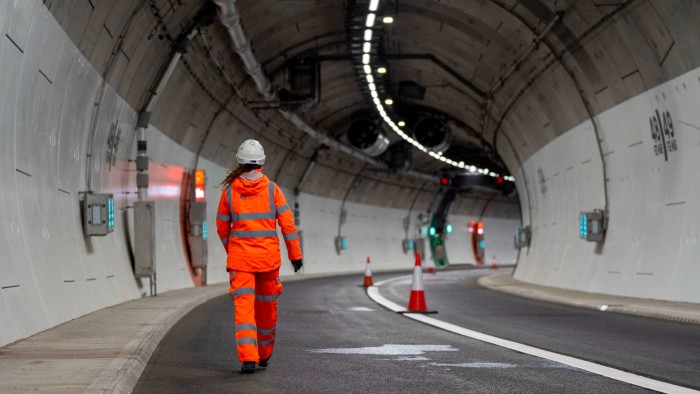Unlock the Editor’s Digest for free
Roula Khalaf, Editor of the FT, selects her favourite stories in this weekly newsletter.
London’s first new toll road in nearly 30 years will open on Monday, with investors hoping the £2.2bn project will provide a model for a wave of private finance initiatives across the UK.
The Silvertown Tunnel, which will link the Royal Docks with the Greenwich Peninsula in the city’s eastern Docklands, aims to ease congestion in the nearby Blackwall Tunnel.
But Transport for London is facing a backlash from local motorists and businesses over the price of new tolls for crossing the river Thames.
Using the Silvertown and Blackwall tunnels will cost £4 for cars at peak times and £1.50 during off-peak hours, with a £10 charge for heavy goods vehicles, reduced to £5 off-peak. Drivers could previously use the Blackwall tunnel for free. The tunnels are free between 10pm and 6am and discounts for small businesses and people on low incomes are available.
Dave Tucker, fleet director for Westminster Waste, a waste management company, said the tolls would cost his fleet of up to 50 vehicles as much as £300,000 a year if they continue to make multiple crossings during the working day.
“This is going to have a huge impact, not just on my company but on lots of local businesses, and they are only just starting to wake up to the true cost that this is going to have on them,” he said. “TfL is hell-bent on destruction.”
Matt Jaffa of the Federation of Small Businesses said it was pushing for further concessions for small companies. “This does entrench a two-tier London driving system as Silvertown, Blackwall and Dartford all charge small business owners in their cars and vans to cross east London, but meanwhile it’s free for west London,” he said.
Silvertown is seen as paving the way for a wider roll out of privately financed infrastructure in the UK.
Transport secretary Heidi Alexander last month confirmed that private finance would be used on the Lower Thames Crossing, a new road and tunnel project to the east of London. TfL said the public-private partnership model was “something which TfL would consider using again”.
However, private finance initiative projects remain controversial as a means of financing UK infrastructure projects. The Conservatives banned the use of PFI for central government projects in 2018 after the National Audit Office declared them poor value for taxpayers.
Since then 14 road and rail projects have been launched by local authorities and regional transport bodies in partnership with the private sector, according to data from trade publication Partnerships Bulletin.

Paul Jarvis, managing editor of Partnerships Bulletin, said most of the recent PPPs in England had been small scale, such as for EV charging infrastructure, but he expected an increase as “more responsibility is given to regional authorities, and the new government continues to talk about working ‘in partnership’ with the private sector”.
Although the Silvertown tunnel will ultimately be paid for by tolls collected by TfL, it has been financed by the Riverlinx consortium, which includes Aberdeen, Invesis, Cintra — part of Spain’s Ferrovial — and SK ecoplant, a South Korean investor.
The estimated £2.2bn cost includes £1bn for construction, as well as investor payments and maintenance over the 25-year life of the design, build and operating contract.
Tolls from the two tunnels are projected to generate £103.8mn in the first year, leaving TfL expecting a loss until 2028, when it is due to start making a surplus that could help pay for other transport network improvements across London.

Rosie Eden, director of concession infrastructure at Aberdeen Investments, Riverlinx’s largest shareholder, said the Silvertown tunnel’s opening showed the PFI model worked and “we are confident [it] can be replicated successfully”.
Eden added that the Silvertown tunnel was made more attractive to investors by reducing certain financial risks — for example, TfL would have to help cover the cost of dealing with any unexploded ordnance found in the area, which was heavily bombed during the second world war.
Dominic Leggett from the Campaign against the Silvertown Tunnel accused TfL of using the toll on the Blackwell tunnel “to conceal the immense costs” of repaying the Silvertown debt. “Essentially you’re taking money away from the poorest people and businesses in London and giving it to banks and investors.”
The campaign group is also concerned that, far from relieving congestion in the area, the route will make pollution and carbon emissions worse, while cyclists will have to catch a dedicated bus through the tunnel.
TfL argues that the proximity of the two tunnels meant charges were needed on both to prevent traffic levels increasing at Blackwall, as drivers would have chosen the free route. It also said that it would monitor pollution closely.
Gareth Bacon, shadow transport secretary, said the “cripplingly high” tolls would hit “local businesses exceptionally hard”. It came “on top of large increases in employers’ national insurance and huge new burdensome regulation on the way”, he added.




